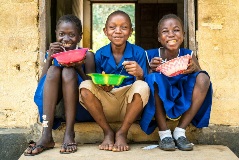Sierra Leone has a school meal programme managed by the Ministry of Basic and Senior Secondary School Education that targets pre and primary schoolchildren. As of 2022, there are no official nutrition standards that define or regulate the types of foods that are provided and sold in and around schools.
School Food

Sierra Leone has a national school meal programme targeted at pre and primary schoolchildren. The programme currently reaches 14 out of 16 districts of the country and is managed by the Ministry of Basic and Senior Secondary School Education, with support from the Ministries of Health, Agriculture, Gender and Children’s Affairs, Local Government and Social Welfare. As of 2021, the long term goal of the country is to transition to a full homegrown model for all pupils enrolled in pre-primary and basic and junior secondary education schools, contributing to the improvement of children’s nutritional status.
The programme provides hot meals during lunchtime to children from public schools, five days a week. The meals should cover 30-45% of the recommended energy and micronutrient daily intake of children (4-11 years old), while their planning and preparation should follow the general recommendations of Sierra Leone’s Food-Based Dietary Guidelines elaborated by the Directory of Food and Nutrition in the Ministry of Health. The design of the menus is carried out considering the seasonal, regional and district specificities of the country, with the involvement of stakeholders from the school community (school directors, teachers, parents and community members) as much as possible.
Dry ingredients for the meals (about 120 grams of cereals, 20 grams of legumes or pulses, 10 grams of oil and 5 grams of iodized salt per child) are supplied by the government, while the school community can supplement the meals directly by donating additional ingredients (e.g: vegetables, dried fish, meat, etc) or cash to procure them.
The headteachers, cooks and volunteers are responsible for ensuring the adequate planning and preparation of the school meals. These groups can access various trainings facilitated by community awareness officers, school feeding monitors and the district nutritionist’s from the Ministries of Health and Education.
The Ministry of Education is responsible for monitoring the meal programme through nutritionists, school feeding monitors and education offices at the local level including some acceptability studies of introducing new foods, however, there is no specific mechanism to assess the nutrition quality or composition of the meals. The Ministry is currently working on an official monitoring and evaluation plan for the programme, which includes the assessment of the nutrition impact of the school meals.
At present, there are no specific nutrition standards that define or regulate the types of foods that are sold in and around schools in Sierra Leone.
Publications

Value Chain Assessment for Home Grown School Feeding, 2021
WFP commissioned an agricultural value chain assessment to guide Sierra Leone’s transition to home-grown school feeding. The assessment made recommendations around more than a dozen local foods.
Articles

Why school lunches mean so much to Munjama and her friends
26/08/2019
Munjama Toma, like most 11 year olds, loves nothing more than to play with her friends and go to school. Also like her friends, she has aspirations for her future, explaining: "I want to be a nurse when I grow up."
